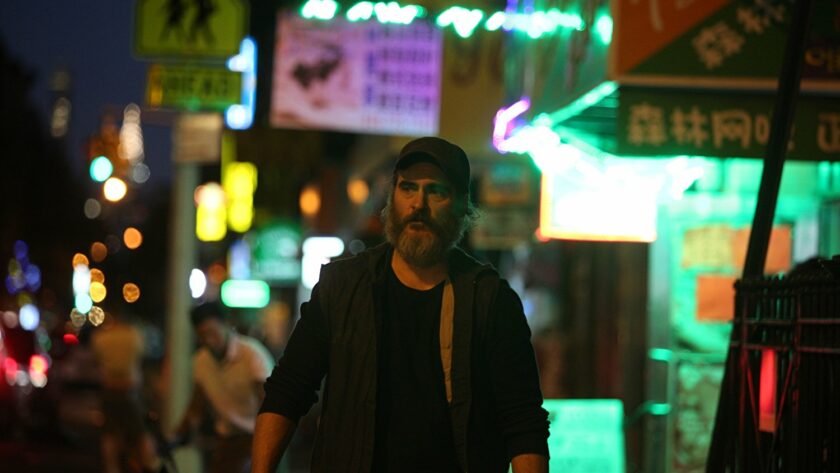Raphael Duhamel reviews Lynne Ramsay’s thriller.
You Were Never Really Here is a brilliantly discordant piece of cinema. With a run time of only eighty-five minutes, Lynne Ramsay’s adaptation of the Jonathan Ames novella stands as a truly original and refreshing take on a familiar story – a US Army veteran tracking down missing girls in a frenzied search for redemption – by prioritising a more visual and conceptual approach to narrative. Joaquin Phoenix’s masterful performance, in the role of Joe, is so grounded and visceral that he appears not to be acting, but to be playing one of the many versions of himself, his sluggish gait and bushy grey beard complementing his omnipresent baseball cap. The movie bears obvious comparison with Taxi Driver, another nightmarish New York odyssey, and Travis Bickle’s famous gun finds its reflection in Joe’s hammer, acting as an extension of the protagonist’s self.
You Were Never Really Here’s most traumatising aspects come not from its action sequences, which are purposefully quiet and cold – one of them is presented almost exclusively through black-and-white security cameras – but from the film’s disquieting depiction of its main character. The first part of the movie focuses on Joe’s very intimate relationship with his mother, played with impeccable subtlety by Judith Roberts, who is in reality the last person standing between him and suicide. His tenderness and generosity contrast heavily with his suicidal and violent tendencies, perfectly encapsulated in one memorable scene during which he contemplates a hammer with a vicious grin. Ramsay presents Phoenix’s character as a brutal yet broken man, dragging his bulky figure throughout the movie’s many hallways, who tries to escape his death wish by expiating the crimes of others. One of the film’s many motifs is suffocation, as proved by the recurring shots of Joe’s head in a plastic bag, as he tests his own limits in an effort to challenge death – a pattern foreshadowed by the opening shot of a man being choked in the same way by the protagonist. Even when he unwinds between two jobs, in a Turkish bath, Joe puts a wet towel on his face in an effort to self-asphyxiate. This suffocation is reflected in the many close-up shots focusing on the anti-hero, trapping him inside the frame and giving the spectator almost no space to breathe.

Another striking aspect of You Were Never Really Here is the omnipresence of mirrors: Ramsay films Joe confronting his past and fractured identity by repeatedly representing him next to or in front of reflective surfaces, inviting the audience to witness the protagonist’s coming to terms with his conflicted past, which is shown through very brief and well-constructed flashbacks. These short scenes are entirely devoid of dialogue, thus reinforcing the movie’s focus on visual and untalkative storytelling, and revealing more about Joe’s motivations and impulses. The most powerful flashback, however, is no longer than twenty seconds, and features him as a soldier, giving a Snickers bar to an Afghan boy, who is subsequently shot by another child for it. These episodes haunt the anti-hero’s memory, mirroring his bodily scars and establishing an inextinguishable guilt in his mind.
Ramsay’s unconventional approach to narrative is undeniably complemented by the film’s breathtaking sound design and score. You Were Never Really Here’s discordance is partly due to the opposition between Joe’s perpetually menacing silence and the very loud city noises surrounding him, contributing to the movie’s chaotic atmosphere. The director reveals that before shooting, she had sent audio clips of gunshots and fireworks to Phoenix, telling him, “This is what’s going on in [Joe’s] head”, further confirming the air of quiet insanity that the protagonist gives off. Jonny Greenwood prolongs his fantastic year with a typically percussion-heavy score, in which he channels his own work in There Will Be Blood and Mica Levi’s eerie compositions for Under the Skin, mixing strings and chords with electronic music. The score’s standout track, “Sandy’s Necklace”, is an ominously dissonant piece which fuses classical instruments with a guitar and bass, appearing at the very beginning of the movie and setting the pace for Joe’s restless journey.

You Were Never Really Here ends up being a tale of impotence, affecting both the protagonist and the audience. Its unconventional structure renders most action scenes anti-climactic, and the relative lack of onscreen violence, especially during what should the film’s turning point, frustrates Joe in his unquenched thirst for blood and the spectator’s expectations of a decisive showdown. The movie’s originality and unpredictability, therefore, comes at the cost of a disappointing ending which leaves the audience wanting more, as if the story was missing a third act. The ending’s divisiveness appears to have been due to many practical reasons, which include a hectic filming schedule and a partial reworking of the script halfway through the shoot, for a movie that was shipped to the 2017 Cannes Film Festival only a few days after coming out of the editing room. Such lateness did not diminish its chances in the eyes of the jury, who handed Phoenix the Best Actor award and Ramsay the Best Screenplay one, tied with Yorgos Lanthimos for The Killing of a Sacred Deer.
You Were Never Really Here is a beautifully abstract and essential movie, whose seemingly unfinished state further confirms its enthralling and magnificently poetic elusiveness.
You Were Never Really Here had its UK premiere at London Film Festival on 14 October. It is out now in the cinemas. Trailer:




